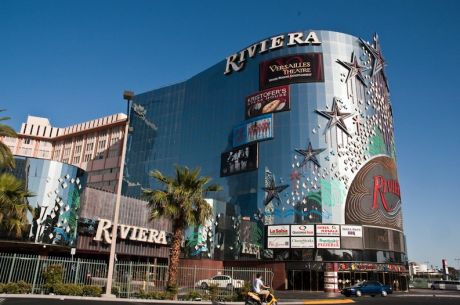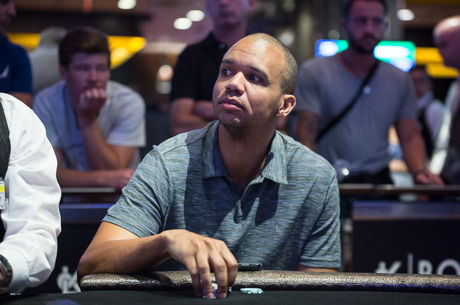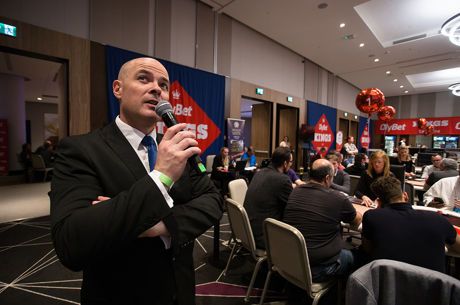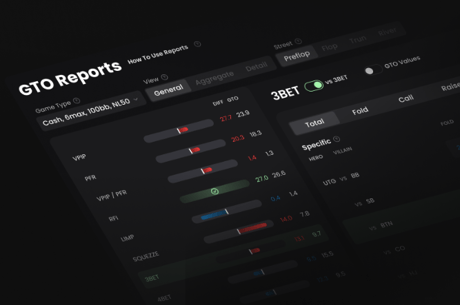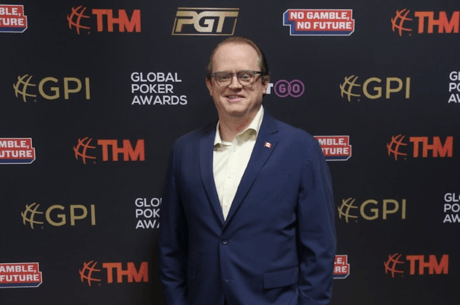Strong Alignment On Display By Caesars and PokerStars Representatives at iGNA Conference
The iGaming North America Conference kicked off on Tuesday at Planet Hollywood in Las Vegas. The sixth edition of the conference will see several insightful and interesting panels take place, and first up was "Executive Panel — The New Deal" with Michael Cohen, SVP, Corporate Development, General Counsel and Corporate Secretary, Caesars Acquisition Company, and Eric Hollreiser, Vice President of Corporate Communications, Amaya Inc.
Sue Schneider, Founder, eGamingBrokerage.com, was the panel's moderator.
It's no secret that for years, Caesars and PokerStars (the latter of which is owned by Amaya) have had their differences. In 2015, the relationship between the two began to go in the other direction, as the two sides formed of an allegiance to fight those opposing and promote online gaming. After seeing Cohen and Hollreiser in action in the opening panel, it appears that more than ever the two sides are aligned in the quest to bring regulated online gaming to the U.S.
Throughout the discussion, there was plenty of agreement between Cohen and Hollreiser. While it's one thing to read a press release with a statement about a shared vision, it's another to see it in person, and this was on display for all those in attendance. Seeing representatives from the two parties agree throughout the entire panel opened a lot of eyes that the Caesars-PokerStars relationship is different than that of the rivalry it has been in the past. The two echoed a shared vision, where, although still competitors in the space, stakeholders can work together for betterment of the industry.
The biggest point of emphasis was the need for alignment. Cohen said the industry needs to align with itself before it's able to give full effort in the push for legislation. One of the key questions he raised was, "How can legislators get on board with legislative efforts when those in the industry can't even align for it?" Hollreiser agreed.
Learn From the Daily Fantasy Sports Industry
To further emphasize the need for alignment within the industry, Cohen used the daily fantasy sports (DFS) industry as an example.
In DFS, industry stakeholders are aligned in their vision, which is to get DFS regulated so that it can continue to be the booming industry it was well on its way to being. In online gaming, the phrase "too many cooks in the kitchen" has been used time and time again when describing how too many parties are looking out for their own interests instead of aligning for the greater good.
Cohen also compared momentum of regulation in the DFS industry to that in the online gaming industry, pointing to the large support DFS has from major sports leagues. If you've been following coverage of DFS regulatory efforts, you'll know that the majority of NFL owners are invested in the DFS industry.
Elsewhere, the NBA and MLB are invested, too. It's these powers that present such strong lobbying teams to help speed up the process towards legalization and regulation. Cohen came full circle in saying that this can be seen as an example of how the DFS industry is much more aligned than the online gaming industry. This is something the online gaming industry can improve upon.
Success of New jersey
Although a small, ring-fenced market, with projections that were far too lofty to being with, Hollreiser pointed to the "relative success" of New Jersey, where PokerStars has quickly vaulted to the top of the online poker market following a full launch in the Garden State on March 21, 2016.
As released by the state each month, revenue numbers for the state continue to improve, as they have been for a few months now. February saw New Jersey's record-setting ways continue, and the state's online poker market spiked to a two-year high thanks to the entrance of PokerStars. Hopefully, it's the entrance of PokerStars that allows all parties to flourish, in the sense that a rising tide lifts all boats. Competition is good and the driving force that pushes stakeholders to offer improved products. This benefits both the industry side and the consumer side.
Hollreiser added that the relative success of New Jersey is helping to push neighboring states to be further along than expected — specifically, Pennsylvania and New York.
Furthermore, as evidenced by the success of New Jersey, an industry that was once widely consider two separate industries — live and online — have seen consolidation between the two. Now "live gaming" and "online gaming" are subsets of the broader "gaming industry." The key is now to continue to work to align the visions of these two subsets to work towards the advancement of gaming as a whole, while also maintaining a healthy level of competition within the space.
Adelson Still in the Way
Speaking of the advancement of gaming, the man doing all that he can to stop online gaming from becoming legal, Sheldon Adelson, had his name brought up a few times. Each time it was to remind those in attendance that he is the biggest opponent to gaming advancement, as so much of gaming's advancement can be tied to online gaming. Although some may think Adelson is only one person with one negative vision, his pockets are infinitely deep and his reach extensive.
Ad Cohen made sure to point out, Adelson is without a doubt the most prominent reason online gaming isn't moving forward as much as it would like to in the U.S. Despite several big players such as Caesars, PokerStars, MGM, and others working to bring online gaming back to the U.S., it's difficult with such a big, and rich, opponent in Adelson who has said he will do whatever it takes to stop online gaming from becoming legal.
Get all the latest PokerNews updates on your social media outlets. Follow us on Twitter and find us on both Facebook and Google+!


